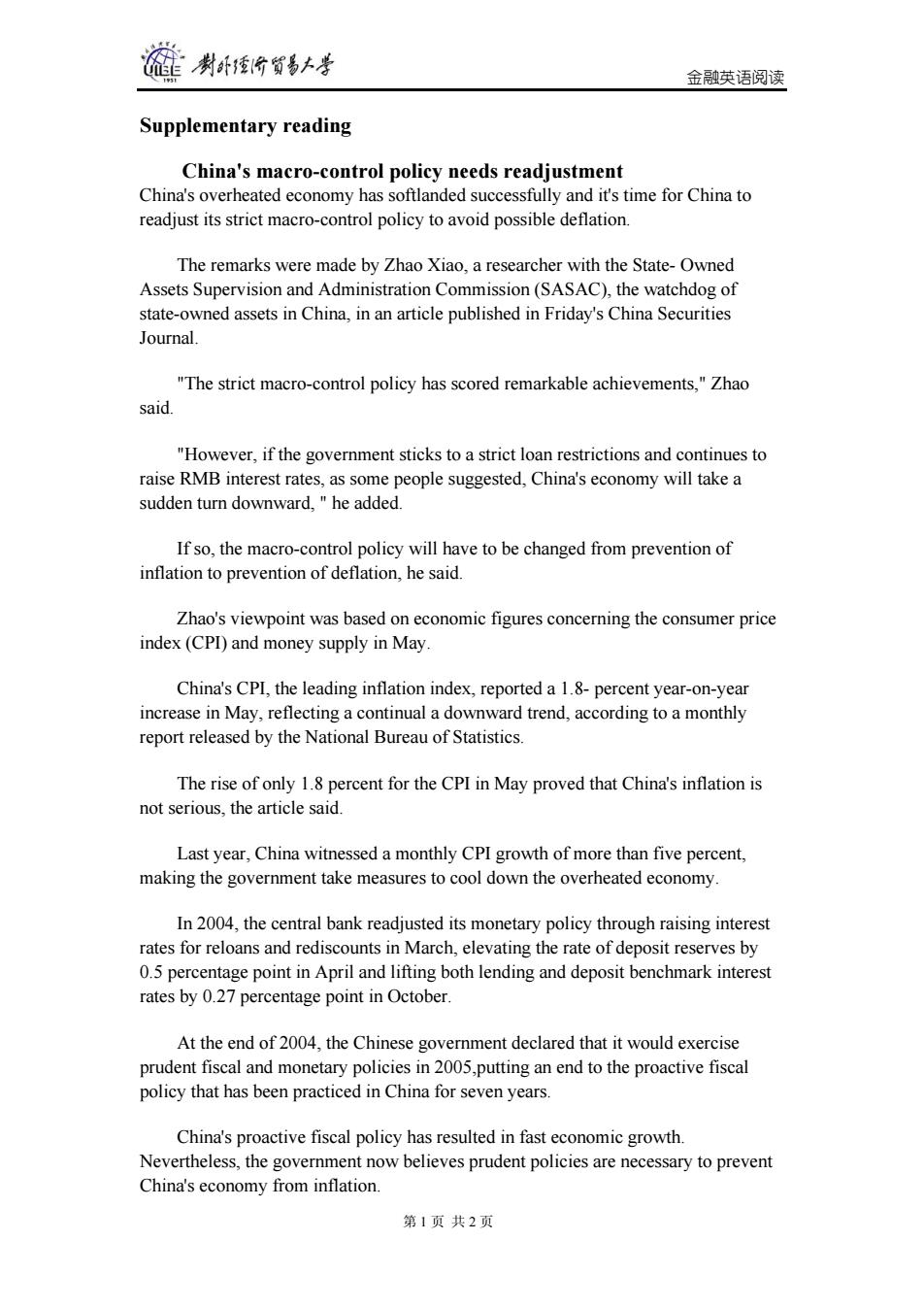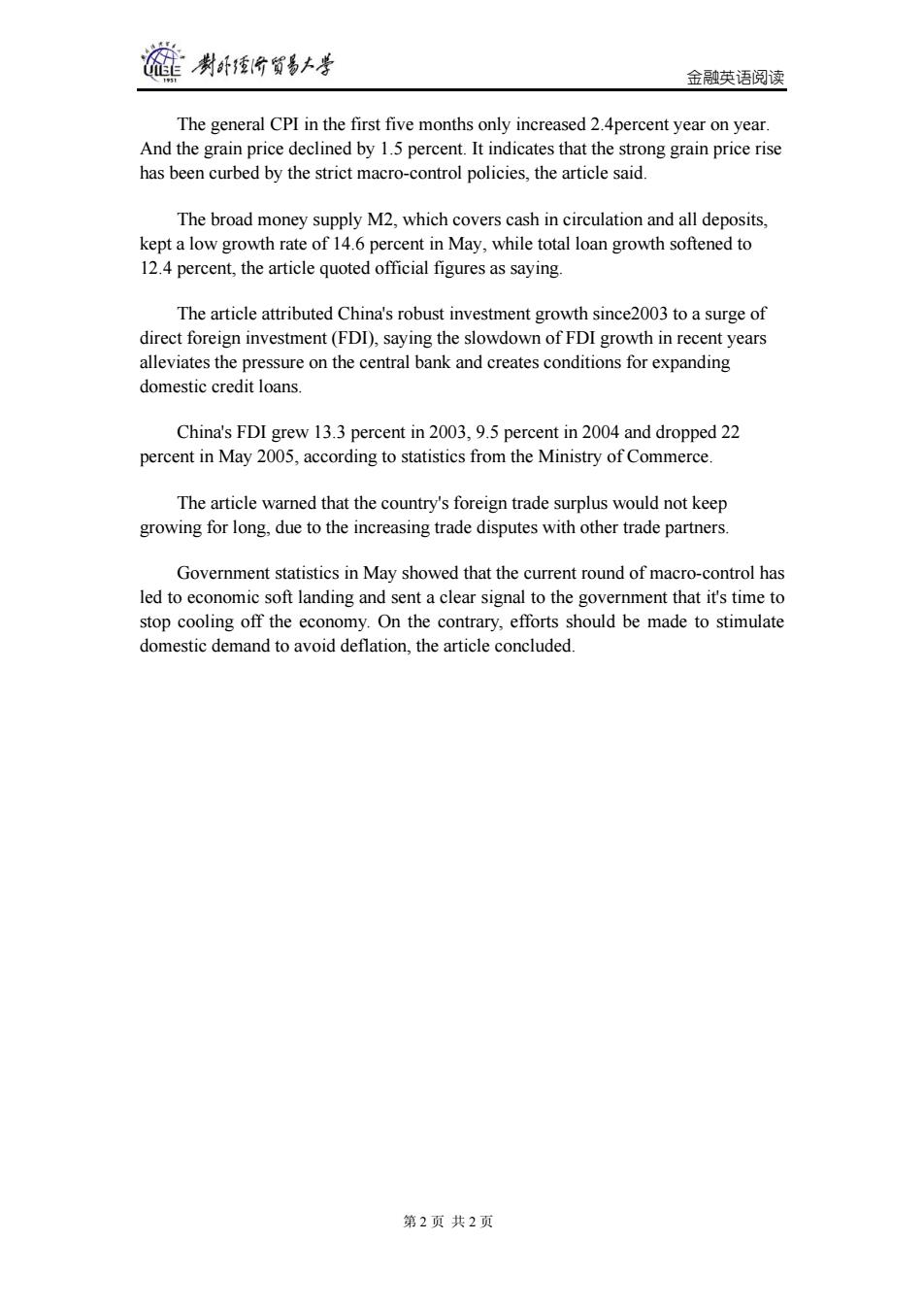
”制卧台贸多上考 金融英语阅读 Supplementary reading China's macro-control policy needs readjustment China's overheated economy has softlanded successfully and it's time for China to readjust its strict macro-control policy to avoid possible deflation. The remarks were made by Zhao Xiao,a researcher with the State-Owned Assets Supervision and Administration Commission(SASAC),the watchdog of state-owned assets in China,in an article published in Friday's China Securities Journal. "The strict macro-control policy has scored remarkable achievements,"Zhao said. "However,if the government sticks to a strict loan restrictions and continues to raise RMB interest rates,as some people suggested,China's economy will take a sudden turn downward,he added. If so,the macro-control policy will have to be changed from prevention of inflation to prevention of deflation,he said. Zhao's viewpoint was based on economic figures concerning the consumer price index(CPI)and money supply in May. China's CPI,the leading inflation index,reported a 1.8-percent year-on-year increase in May,reflecting a continual a downward trend,according to a monthly report released by the National Bureau of Statistics. The rise of only 1.8 percent for the CPI in May proved that China's inflation is not serious,the article said. Last year,China witnessed a monthly CPI growth of more than five percent, making the government take measures to cool down the overheated economy. In 2004,the central bank readjusted its monetary policy through raising interest rates for reloans and rediscounts in March,elevating the rate of deposit reserves by 0.5 percentage point in April and lifting both lending and deposit benchmark interest rates by 0.27 percentage point in October. At the end of 2004,the Chinese government declared that it would exercise prudent fiscal and monetary policies in 2005,putting an end to the proactive fiscal policy that has been practiced in China for seven years. China's proactive fiscal policy has resulted in fast economic growth Nevertheless,the government now believes prudent policies are necessary to prevent China's economy from inflation. 第1页共2页
金融英语阅读 Supplementary reading China's macro-control policy needs readjustment China's overheated economy has softlanded successfully and it's time for China to readjust its strict macro-control policy to avoid possible deflation. The remarks were made by Zhao Xiao, a researcher with the State- Owned Assets Supervision and Administration Commission (SASAC), the watchdog of state-owned assets in China, in an article published in Friday's China Securities Journal. "The strict macro-control policy has scored remarkable achievements," Zhao said. "However, if the government sticks to a strict loan restrictions and continues to raise RMB interest rates, as some people suggested, China's economy will take a sudden turn downward, " he added. If so, the macro-control policy will have to be changed from prevention of inflation to prevention of deflation, he said. Zhao's viewpoint was based on economic figures concerning the consumer price index (CPI) and money supply in May. China's CPI, the leading inflation index, reported a 1.8- percent year-on-year increase in May, reflecting a continual a downward trend, according to a monthly report released by the National Bureau of Statistics. The rise of only 1.8 percent for the CPI in May proved that China's inflation is not serious, the article said. Last year, China witnessed a monthly CPI growth of more than five percent, making the government take measures to cool down the overheated economy. In 2004, the central bank readjusted its monetary policy through raising interest rates for reloans and rediscounts in March, elevating the rate of deposit reserves by 0.5 percentage point in April and lifting both lending and deposit benchmark interest rates by 0.27 percentage point in October. At the end of 2004, the Chinese government declared that it would exercise prudent fiscal and monetary policies in 2005,putting an end to the proactive fiscal policy that has been practiced in China for seven years. China's proactive fiscal policy has resulted in fast economic growth. Nevertheless, the government now believes prudent policies are necessary to prevent China's economy from inflation. 第 1 页 共 2 页

莲 制卧价贸易上兰 金融英语阅读 The general CPI in the first five months only increased 2.4percent year on year. And the grain price declined by 1.5 percent.It indicates that the strong grain price rise has been curbed by the strict macro-control policies,the article said. The broad money supply M2,which covers cash in circulation and all deposits, kept a low growth rate of 14.6 percent in May,while total loan growth softened to 12.4 percent,the article quoted official figures as saying. The article attributed China's robust investment growth since2003 to a surge of direct foreign investment(FDI),saying the slowdown of FDI growth in recent years alleviates the pressure on the central bank and creates conditions for expanding domestic credit loans. China's FDI grew 13.3 percent in 2003,9.5 percent in 2004 and dropped 22 percent in May 2005,according to statistics from the Ministry of Commerce. The article warned that the country's foreign trade surplus would not keep growing for long,due to the increasing trade disputes with other trade partners. Government statistics in May showed that the current round of macro-control has led to economic soft landing and sent a clear signal to the government that it's time to stop cooling off the economy.On the contrary,efforts should be made to stimulate domestic demand to avoid deflation,the article concluded. 第2页共2页
金融英语阅读 The general CPI in the first five months only increased 2.4percent year on year. And the grain price declined by 1.5 percent. It indicates that the strong grain price rise has been curbed by the strict macro-control policies, the article said. The broad money supply M2, which covers cash in circulation and all deposits, kept a low growth rate of 14.6 percent in May, while total loan growth softened to 12.4 percent, the article quoted official figures as saying. The article attributed China's robust investment growth since2003 to a surge of direct foreign investment (FDI), saying the slowdown of FDI growth in recent years alleviates the pressure on the central bank and creates conditions for expanding domestic credit loans. China's FDI grew 13.3 percent in 2003, 9.5 percent in 2004 and dropped 22 percent in May 2005, according to statistics from the Ministry of Commerce. The article warned that the country's foreign trade surplus would not keep growing for long, due to the increasing trade disputes with other trade partners. Government statistics in May showed that the current round of macro-control has led to economic soft landing and sent a clear signal to the government that it's time to stop cooling off the economy. On the contrary, efforts should be made to stimulate domestic demand to avoid deflation, the article concluded. 第 2 页 共 2 页